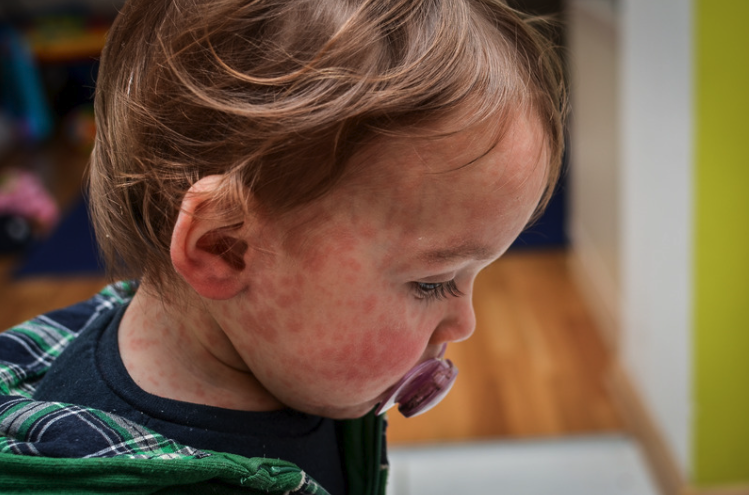Measles FAQ: What Every Parent Needs to Know
What is Measles?
Measles (also called Rubeola) is a highly contagious viral illness that spreads through the air when an infected person coughs, sneezes, or breathes nearby. The virus can linger in the air and on surfaces for up to 2 hours. It’s most recognizable by a red, blotchy rash and often begins with fever, cough, runny nose, and red, watery eyes.
How does Measles spread?
Measles spreads through microscopic respiratory droplets. It is one of the most contagious viruses, with a 90% transmission rate among unvaccinated individuals in close-contact environments.
What are the symptoms of Measles?
Symptoms usually appear 7–14 days after exposure:
- High fever
- Cough
- Runny nose
- Red, watery eyes
- Tiny white spots inside the mouth (Koplik spots)
The Measles rash usually appears 3–5 days after initial symptoms, starting on the face and spreading downward. Fevers can rise above 104°F.
Is Measles dangerous?
Measles can be dangerous. While many recover without issue, 1 in 5 unvaccinated people in the U.S. who get Measles will be hospitalized. Serious complications include:
- Pneumonia
- Encephalitis (brain swelling)
- Permanent hearing loss
- Rarely, death
Infants, pregnant people, and those with weak immune systems are at higher risk.
Who is most at risk for Measles?
- Unvaccinated children and adults
- Infants under 12 months (too young for routine MMR vaccination)
- People with weakened immune systems
- Individuals in areas experiencing Measles outbreaks
- Those exposed through international travel to areas where measles is more common
Why are we seeing Measles outbreaks again?
Although Measles was declared eliminated in the U.S. in 2000, outbreaks have returned due to:
- Decreased vaccination rates
- Misinformation about vaccine safety
- Increased international travel to areas where measles is more common
Does the MMR vaccine protect against Measles?
Yes. The MMR vaccine (Measles, Mumps, Rubella) is very effective:
- 1 dose = ~93% protection
- 2 doses = ~97% protection
Most children in the U.S. receive:
- 1st dose at 12–15 months
- 2nd dose at 4–6 years
Can my baby get the MMR vaccine early?
In outbreak situations or before international travel, infants as young as 6 months old may receive an early dose. Talk to your pediatrician to see if early vaccination is appropriate.
What should I do if my child is exposed to Measles?
If your child is unvaccinated and may have been exposed:
- Call your pediatrician immediately
- You may be advised to get the MMR vaccine within 72 hours of exposure
- In some cases, immune globulin may be offered for temporary protection
Vaccinated children who are healthy are unlikely to need any intervention.
Can vitamin A or cod liver oil prevent or cure Measles?
No. Vitamin A cannot prevent or cure Measles. However, for children already infected, a physician may recommend vitamin A to support recovery and prevent complications like blindness. Do not self-administer large doses—excess vitamin A can be harmful.
How can I protect my unvaccinated baby from Measles?
If your baby is too young for vaccination:
- Avoid crowded places and public transport during outbreaks
- Keep sick visitors away
- Ensure all caregivers are vaccinated, including grandparents and older caregivers born before 1957 who may no longer be immune or have waning natural immunity. Your specific circumstances and concerns can be discussed with your pediatrician for tailored guidance.
- Practice excellent hygiene: handwashing, disinfecting surfaces, covering coughs/sneezes
- Continue breastfeeding if possible for added immune support
- Ask your pediatrician about early MMR if travel or exposure risk is high
If I was vaccinated, am I protected from Measles?
Most likely. If you received 2 doses of MMR, you’re considered protected. If unsure, check your records or speak with your doctor. Adults born before 1957 are generally considered immune due to likely natural exposure, but they should speak with their physician to better understand their individual circumstances.
Where can I find reliable information about Measles?
Turn to trusted sources, such as:
- Your child’s pediatrician
- Centers for Disease Control and Prevention (CDC)
- World Health Organization (WHO)
- National Institutes of Health (NIH)
- Local health departments
At Concierge Pediatrics, our board-certified pediatricians are here to answer your questions and help protect your family. Want more information on Measles? Read our blog.
Need help understanding your child’s vaccination status?
We’re here for you. If you’re a Concierge Pediatrics member or parent seeking guidance, give us a call. Your child’s safety and well-being are our top priority.
